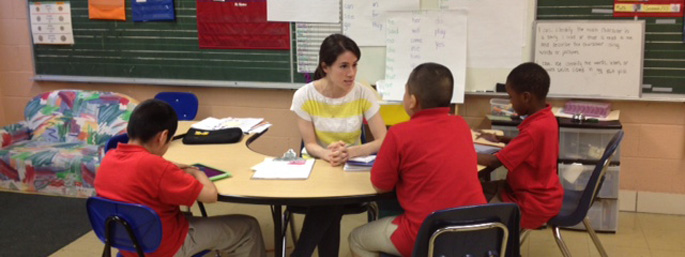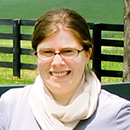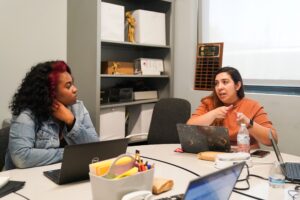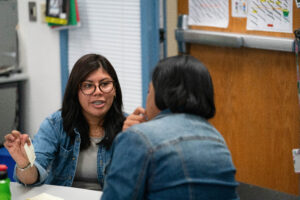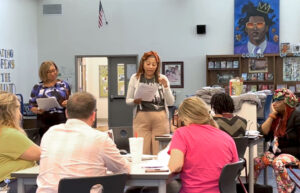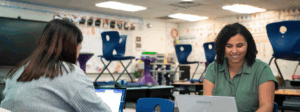In our recent report Leap Year, we found that first-year teachers perform very differently from one another. Contrary to the long-held assumption that first-year teachers are universally awful, plenty do pretty well, and some are exceptional. They knock it out of the park almost from the get-go.
We’ve been seeing this with the first-year teachers we’re evaluating with our Assessment of Classroom Effectiveness, or ACE. We track their effectiveness with students through multiple classroom observations, student surveys, principal ratings and student achievement data, and base our certification decisions on how they perform. This school year, a small group of these teachers were great right away and just kept getting better throughout the year.
Since we’re all about recognizing amazing teachers at TNTP, we’re honoring these teachers’ performance by recommending them for certification “with distinction.” Teachers in this group were exceptional across the various measures. They are living proof that some teachers can become outstanding practitioners very early in their careers—and we expect them to continue to grow in the years to come. Here are three examples from our Teaching Fellows programs.
Hope Snead
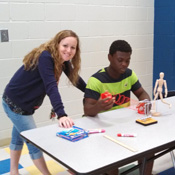 One thing is absolutely clear in Hope’s eighth grade physical science class at Baker Middle School in Columbus, Ga.: she loves science, and she wants her students to love science as much as she does.
One thing is absolutely clear in Hope’s eighth grade physical science class at Baker Middle School in Columbus, Ga.: she loves science, and she wants her students to love science as much as she does.
“Science is important because it affects everything they do in their lives, from the energy in their house to their reflection in the mirror,” she said. “Relating science to what they are familiar with, then they start to see why it’s important. Newton’s law of motion, for example, is important to football and soccer.”
Hope makes concepts easy to remember and relates them to real life. A recent lesson on particle movement looked more like a gym class: Hope took her students outside and had them use their bodies to represent different states of matter. Students huddled close together to become “solid,” then drifted apart and ran around to represent liquids and gases.
Hope taught adult education and corporate training classes before becoming a Fellow, including medical terminology and computer skills classes. But those classes were one-size-fits-all, she said. The biggest thing she’s learned this year was how to engage young students, who arrive in her class with a diverse set of skills and interests. That means building differentiated lessons that will allow struggling students to gain foundational skills, but draw gifted students in as well.
This past year, for example, one of her brightest students was clearly bored and spent much of the class drumming on his desk. Hope saw an opportunity when she learned that his real passion was rap music; that student wrote and performed a dozen original science raps to help his fellow students master the material.
“It’s all about finding students’ interests, and connecting it to class,” she said.
Grace Ascher
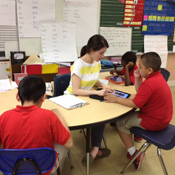 At the William H. Brown Elementary School in Chicago, Grace teaches a self-contained classroom for students with autism who are considered to have moderate to severe needs. (That’s Grace and her students in the large photo above.) There were just two out of 832 teachers across the country who earned the maximum scores on ACE this year, and Grace was one of them.
At the William H. Brown Elementary School in Chicago, Grace teaches a self-contained classroom for students with autism who are considered to have moderate to severe needs. (That’s Grace and her students in the large photo above.) There were just two out of 832 teachers across the country who earned the maximum scores on ACE this year, and Grace was one of them.
Her coach says she is successful because she uses data to drive instruction and tailors her teaching to individual students’ needs and interests. During a recent class on sight words, for example, Grace and one of her students reviewed the target words in isolation, and then as part of a reading passage. She kept detailed notes, which she used to design the next sight-word lesson.
Grace’s students have a wide range of cognitive, social and academic abilities, including two students who are non-verbal. So her students learn and practice their social skills throughout the course of the school day. Grace holds a “morning meeting” each day, and enlists her students to ask and answer one another’s questions. She also works to ensure students are taking notice and reacting appropriately to what others are doing; when one classmate masters a task, she prompts others do a high-five in celebration.
Each of Grace’s students has an individualized behavior management system. One student might earn a favorite reward, like building blocks, after completing two assignments, whereas another student might earn another reward, like water-color painting after completing five activities. Students can visually track their progress by earning stickers or stamps on their behavior cards.
In addition, Grace has gone above and beyond to advocate for her students and their families, including educating her colleagues and other students about autism.
Michael Marzelli
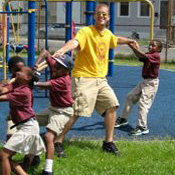 Mike’s second-grade classroom at Success Preparatory Academy in New Orleans straddles two seemingly unrelated categories: incredibly organized and incredibly fun. He’s got strict rules and routines in place, and often calls on his students by their number, giving class time the feeling of game time.
Mike’s second-grade classroom at Success Preparatory Academy in New Orleans straddles two seemingly unrelated categories: incredibly organized and incredibly fun. He’s got strict rules and routines in place, and often calls on his students by their number, giving class time the feeling of game time.
During a recent math lesson, his students sat on the classroom carpet and learned the difference between “greater than” and “less than” using an alligator mouth. Students helped lead the lesson, including by chanting “Way to go!” each time one of their fellow students answered a difficult question correctly.
After working together as a class for about 15 minutes, students were divided into groups by skill level, and finished complementary assignments tailored to their skill level. Then those who finished their work early were free to choose a new activity while the rest of their classmates completed their assignments. By the end of the day 96 percent of his students showed mastery of the day’s skill.
Mike has learned to succeed in many environments: he worked as a newspaper reporter and editor before becoming an educator, and was a special-education paraprofessional at his school last year. His coaches say that he thoughtfully analyzes feedback, immediately incorporates it to improve his teaching and never rests on past success. Of his students, he recently said “they are a constant reminder that what we do is not work, it’s a privilege we’ve been entrusted with.”
Three amazing teachers, at the start of three amazing careers. Forget about summer vacation—I’m excited to see what these folks do in their classrooms next fall.
